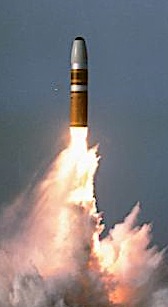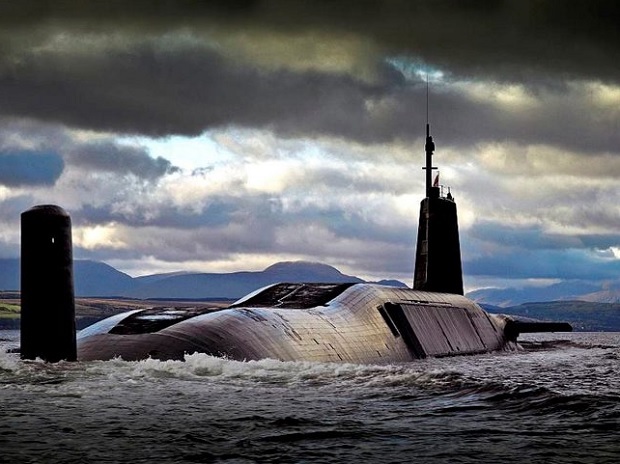|
Arsenal of Information
Dossiers:
UN Treaty to Prohibit Nuclear Weapons
B61-12 Enhanced Nuclear Bomb
LRSO: New Nuclear Cruise Missile
US Nukes at Incirlik AFB, Turkey
Trump Admin and Nuclear Weapons Policy
Kirtland AFB Nuclear Weapons Complex
Flashpoint: NATO-Russia
Flashpoint: North Korea
MOX / Plutonium Disposition
Fukushima Disaster and Updates
Nuke Lab Contractors Illegal Lobbying
Revolving Door: The Case of Heather Wilson
Marshall Islands Lawsuit
Plutonium Pit Production at LANL
Nuclear Testing Since 1945
Atomic Histories
|
The Trident Malfunction and Hacking
Disclosure of Trident Missile Launch Gone Awry Causes a Furor in UK
(Our original Report- updates below)
The Sunday Times broke the story of the June 2016 test launch from HMS Vengeance off the coast of Florida.
 "Reports state that the missile was meant to fly over 5,600 miles to a target off the coast of Africa, but instead went awry, flying in the complete opposite direction towards the US. The Times reports that the failure caused massive disruptions at the highest levels of government in London, and Downing Street decided to cover up the results of the test through deep classification. The cause remains top secret, the paper adds, but quotes a senior naval source as saying the missile suffered an in-flight malfunction after launching out of the water. The Times said the missile was not armed with a nuclear warhead but contained a small amount of explosives. which were detonated when the order was given to abort. "Reports state that the missile was meant to fly over 5,600 miles to a target off the coast of Africa, but instead went awry, flying in the complete opposite direction towards the US. The Times reports that the failure caused massive disruptions at the highest levels of government in London, and Downing Street decided to cover up the results of the test through deep classification. The cause remains top secret, the paper adds, but quotes a senior naval source as saying the missile suffered an in-flight malfunction after launching out of the water. The Times said the missile was not armed with a nuclear warhead but contained a small amount of explosives. which were detonated when the order was given to abort.
(ref)
/ (ref)
The furor concerns the fact that replacement of the Trident system was up for a vote in Parliament in July, one month after the incident, which was not disclosed at the time. The Scottish National Party and some of the Labour Party opposed replacement. By July, the UK had voted for Brexit, PM Cameron had resigned, Theresa May had taken over, and she gave a strong speech at Parliament in support of Trident renewal, which was approved. The Campaign for Nuclear Disarmament (CND) described reports of a misfire as a "very serious failure". "There's absolutely no doubt that this would have impacted on the debate in Parliament on Trident replacement," General Secretary Kate Hudson said. "Nuclear weapons technology is not 100% failsafe. In so many ways it is a disaster waiting to happen, the consequences of which are too terrible to comprehend," she added.
Caroline Lucas, co-leader of the Green Party of England and Wales, called for "full disclosure", adding: "A missile veering off course is deeply concerning. Imagine such a failure occurring in a 'real-world' situation - it could lead to the slaughter of millions of people in an ally's country." (ref)
On January 22, Theresa May was asked four times in a TV interview if she knew about the failure at the time of the debate in Parliament, and refused to answer.
Was the Trident hacked?
The UK government's deep classification, and later stonewalling on the story, may simply have been down to the parliamentary vote; however it should be noted that among the worries of those concerned about the hacking of weapons systems- in fact one of the worst nightmares- is an unauthorized launch or an inflight re-targeting of an armed missile toward an ally or self. Reports on this danger (see below) usually end with an expert saying there's nothing to worry about because the Trident system isn't on the internet- there's an "air gap"; the only vulnerability being when the sub is in port undergoing repairs and computer upgrades. (see: "Trident Software To Be Revised Over Hacking Fears")
But HMS Vengeance was in fact in port undergoing upgrades to it's computer systems 6 months before the incident: "HMS Vengeance, one of the UK's four Vanguard-class submarines, returned to sea for trials in December 2015 after a 350 million pound refit, which included the installation of new missile launch equipment and upgraded computer systems."- (BBC)
And Paul Ingram, the executive director of the British American Security Information Council, said telemetric data suggests either a manual inputting problem or a software one rather than a failure on the part of the rocket engine.
Earlier reports:
- March 2016: Trident software to be revised over hacking fears - Nuclear system to be updated to protect against possibility of cyber-attack.
- January 2016: 'Trident is old technology': the brave new world of cyber warfare -
Forget debates about Britain's nuclear deterrent. New technology means a country can be brought to its knees with the click of a mouse.
- January 2016: Britain's Doomsday Nuke Subs Still Run Windows XP -
The fate of the country's nukes is in the hands of an obsolete operating system.
- Nov. 2015: Trident nuclear weapons could be hacked- Britain's biggest deterrent faces terrifying risk of cyber-attack.
Update, January 24, 2017, The Times: US urged Britain to keep Trident blunder secret
NYTimes, March 14, 2017:
Why Our Nuclear Weapons Can Be Hacked
"It is tempting for the United States to exploit its superiority in cyberwarfare to hobble the nuclear forces of North Korea or other opponents... But United States forces are also vulnerable..."
Bruce Blair NYTimes OpEd

May 31, 2017:
US/UK Trident: A Hackable Doomsday Machine?
Earlier this year we learned that in June 2016, an unarmed Trident nuclear missile launched from a British submarine off the coast of Florida targeting a point in the south Atlantic instead turned around and headed for Georgia, and had to be destroyed in mid-flight. In our coverage of the incident, we wondered whether "the mishap" may have been caused by a hack. (see "Trident Malfunction and Hacking")
Consider that the recent WannaCry worm infected 300,000 computer systems in 160 countries, and weeks later we still don't know who did it. If such a worm were able to infect defense computers in several nuclear powers, and trigger a full-blown nuclear exchange wiping out civilization, it could be that the surviving remnants would never know how or why it happened. It may be hard to consider such an absurd and meaningless annihilation of everything we hold dear in our world, but the scenario is not impossible.
On May 31, British American Security Information Council released a major in-depth and detailed survey of the vulnerabilities of Britain's Trident nuclear force to hacking:
Hacking UK Trident: A Growing Threat (View /download PDF) Some excerpts:
- "A cyber-attack may target the submarine, command and control, or the missile launch system. It can attempt to disrupt or change launch coordinates to divert the original course of the missile, or to disrupt or neutralize the warheads themselves...
- "To imagine that critical digital systems at the heart of nuclear weapon systems are somehow immune or can be confidently protected by dedicated teams of network managers is to be irresponsibly complacent. When states invest hundreds of billions of dollars in offensive nuclear weapon systems, the incentives are there amongst adversaries to develop capabilities that could neutralize that threat."
- "Relying as it does upon numerous computers, complex software and endless lines of code, the Trident system is undeniably vulnerable to cyber interference.... The overall impact is one of far greater instability and uncertainty of outcomes. When considering the consequences of nuclear weapons use, and the widespread recognition that once a nuclear exchange starts between nuclear armed states it is very unlikely to remain limited, is this really an acceptable future?"
Note the report's remarks regarding the June 2016 incident: "The failure could have several explanations... It was also consistent with the injection of malware into the failing component or into the system transmitting telemetry data from the missile. In other words, if there had been a hack, this is possibly what it would have looked like."
|


 "Ours is a world of nuclear giants and ethical infants. We know more about war than we know about peace, more about killing than we know about living. We have grasped the mystery of the atom and rejected the Sermon on the Mount."
-Gen. Omar Bradley
"Ours is a world of nuclear giants and ethical infants. We know more about war than we know about peace, more about killing than we know about living. We have grasped the mystery of the atom and rejected the Sermon on the Mount."
-Gen. Omar Bradley